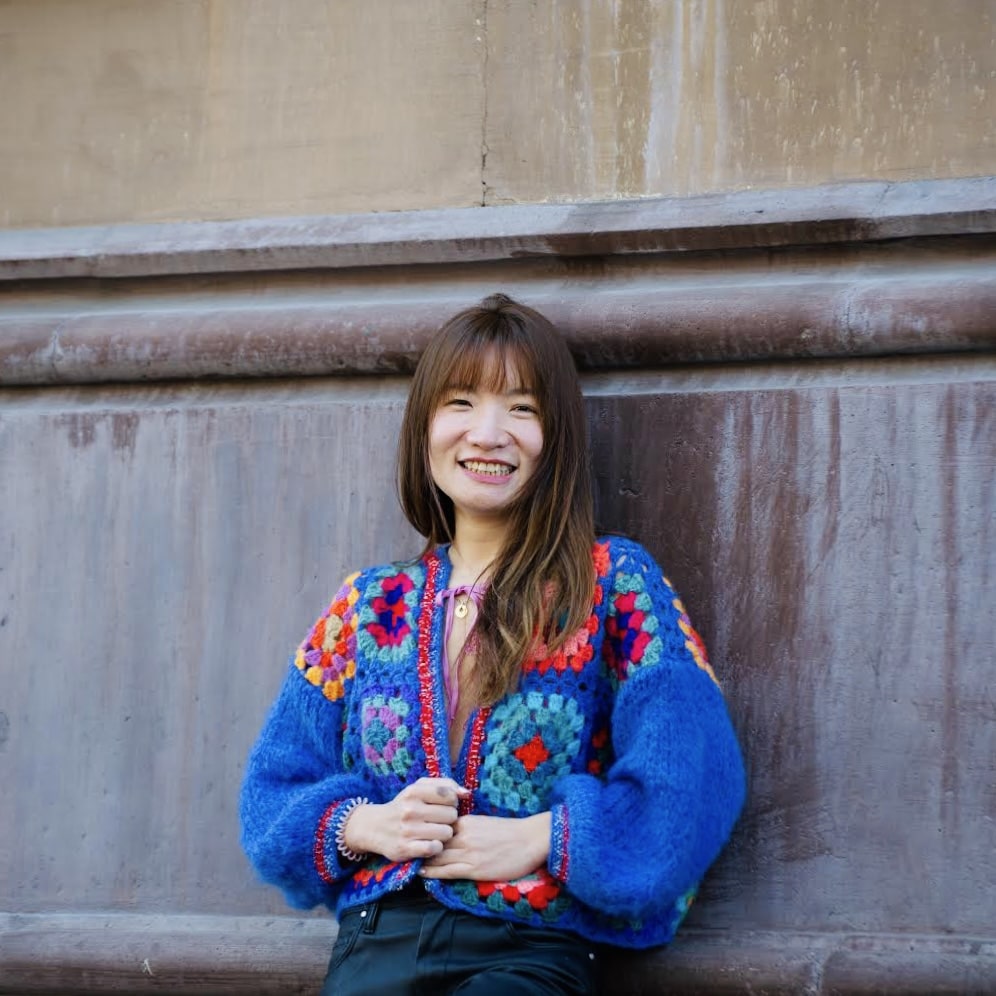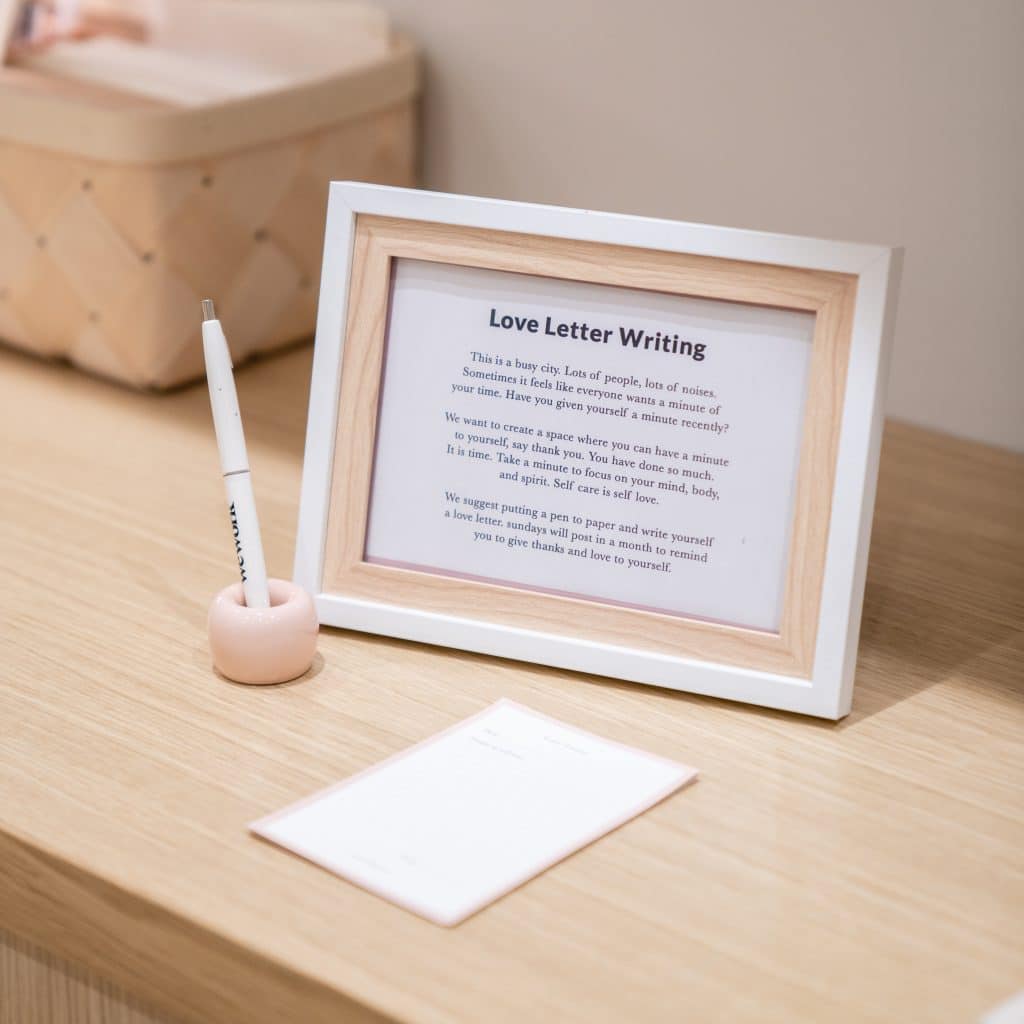You found Founder & CEO Amy’s Love Letter to Her Younger Self.
A self-love letter to my younger self is a personal written expression where individuals address their past selves, offering compassion, understanding, and advice. For example, someone might write about overcoming childhood fears, forgiving past mistakes, or acknowledging personal growth. The purpose of these letters is to foster self-compassion and emotional healing by reflecting on one’s life journey. These letters are also known as “advice to younger me” and “healing through writing.”
This topic is similar to Talking Wellness and Self-Care with YouMe Lin.
This list includes:
- advice to younger me
- love letters to past self
- childhood reflection letter
- emotional growth letters
- empowering letters
- healing through writing
Let’s get to it!
1. Amy’s Love Letter to My Younger Self
2. How to Start a Self-Love Letter
When reflecting on writing a self-love letter to your younger self, you may experience a rush of emotions and memories. Delving into the past allows you to offer comfort, wisdom, and reassurance to the person you used to be. This process provides a unique opportunity to acknowledge growth, progress, struggles, and challenges faced along the way. It can lead to increased self-awareness and acceptance of your journey. As you craft the letter, consider how your words will impact your younger self. Express understanding for the difficulties they faced and offer words of encouragement that you wish you had heard during those hard times. Emphasize how those experiences shaped who you are today and appreciate the strength it took to overcome obstacles. Showing compassion towards your younger self can cultivate a deeper sense of self-compassion in your current life.
Writing a self-love letter is not just about addressing past wounds; it is also an act of healing in the present moment. Through this process, you honor your growth, resilience, and capacity for love and forgiveness. Embrace this opportunity as a powerful tool for personal growth that fosters greater self-acceptance and appreciation for the journey taken so far. Composing a self-love letter is an act of kindness that bridges the gap between past experiences and present understanding. It serves as a reminder of how far you have come while offering solace to the person who once navigated uncertainties. Embrace this exercise as a nurturing gesture towards yourself with immense transformative potential for cultivating inner peace and acceptance.
Learn more about starting a self-love letter.
3. Core Message of a Self-Love Letter
The primary message in a self-love letter to your younger self revolves around understanding, forgiveness, and acceptance. It entails acknowledging the challenges and insecurities you encountered in the past and extending compassion and kindness to that younger version of yourself. By recognizing both the struggles and victories of your younger self, you can nurture a deeper sense of self-love and gratitude for the progress made on your journey. Embracing your younger self with love has the potential to heal old wounds and establish a firmer foundation for self-assurance and personal growth. Composing a self-love letter to your younger self enables you to contemplate the experiences that have influenced the person you are today. It offers a chance to express appreciation for the wisdom gained from previous errors and rejoice in moments of happiness and resilience. By viewing memories through a compassionate lens, you can reframe negative beliefs or perceptions about yourself and develop a more positive connection with your past. Ultimately, drafting a self-love letter to your younger self represents an act of self-nurturing that can nurture increased resilience, inner tranquility, and emotional wellness. It reminds you that despite any challenges faced previously, you merit love, respect, and kindness – both from others as well as from yourself. Embracing every part of your journey with love empowers you to advance with confidence, thankfulness, and authenticity across all aspects of life.
Learn more about the core message of a self-love letter.
4. Emotional Insights
Exploring emotions in a self-love letter to one’s younger self can be a powerful tool for personal growth and healing. Reflecting on past experiences and sharing insights with oneself can offer comfort and understanding. Looking back at tough times with kindness can help build self-love. Recognizing the strength needed to overcome challenges can bring solace to a younger version of oneself who may have felt lost. Embracing vulnerability and acknowledging past struggles are crucial steps toward healing old wounds. By writing a letter filled with emotional reflections, individuals can acknowledge their growth and resilience. Expressing gratitude for the lessons learned can nurture self-worth and appreciation for the journey. Offering words of wisdom and encouragement to a younger self can provide reassurance that they deserve love, forgiveness, and understanding. In summary, exploring emotions in a letter to one’s younger self is an act of kindness that fosters personal growth. This practice helps individuals embrace their past with empathy, paving the way for greater self-acceptance and love in the present moment.
Learn more about emotional insights of self-love letter writing.
5. Final Reflection
When individuals look back on their past experiences, they often engage in a final reflection to acknowledge their growth and development. This self-appreciation letter serves as a powerful tool for introspection. By expressing gratitude for the challenges faced and lessons learned, one can offer compassion to their younger self while recognizing their resilience. It is an opportunity to embrace one’s journey with kindness and understanding, fostering a sense of closure and acceptance. Reflecting on the past can provide valuable insights into personal growth and transformation. Through this final reflection, individuals can recognize the strength they have gained from overcoming obstacles and navigating difficult circumstances. This process allows for a deeper appreciation of one’s journey and a celebration of the progress made along the way. By acknowledging both the struggles and triumphs of the past, individuals can cultivate a greater sense of self-awareness and compassion. Ultimately, writing a self-appreciation letter to one’s younger self is an act of healing and empowerment. It allows individuals to release any lingering regrets or resentments by offering forgiveness and understanding to themselves. This final reflection serves as a reminder of how far one has come and encourages continued growth with love and acceptance. Embracing this practice can nurture inner peace, resilience, and a profound connection to oneself. In conclusion, engaging in a final reflection through a self-appreciation letter offers an opportunity for deep introspection, gratitude, healing, and empowerment. It enables individuals to honor their past experiences while embracing personal growth with kindness and compassion. Such reflections are essential steps towards fostering self-love, acceptance, and inner peace in one’s ongoing journey of life.
Learn more about reflections in self-love letter writing.
Final Thoughts on self-love letter to my younger self
Reflecting on the process of writing a self-love letter reveals its profound impact on personal development. It allows individuals to reconnect with their past experiences from a place of kindness and wisdom. Writing these letters can significantly aid in emotional healing and foster a greater sense of empathy towards oneself. It serves not just as a therapeutic tool but also as a powerful reminder of how far one has come.
Next, check out other posts about Kelly, founder @ Strong Women Co, helps women be their strongest, happiest and healthiest selves.






